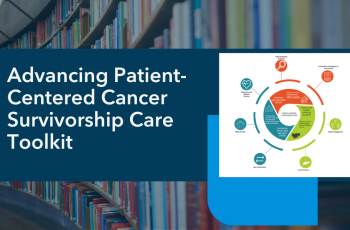This work was supported by Cooperative Agreement #NU58DP007539-01 from the Centers for Disease Control and Prevention (CDC).
CCCNP - Health Behaviors for Cancer Survivors
The American Society of Clinical Oncology has compiled resources to help people with cancer navigate COVID-19.
The GW Cancer Center developed the Advancing Patient-Centered Cancer Survivorship Care Toolkit to support training and technical assistance from Comprehensive Cancer Control Programs/Coalitions to health care providers/organizations in order to improve patient-centered cancer survivorship care in…
The American Cancer Society, in partnership with the Comprehensive Cancer Control National Partnership, developed this guide to detail the importance of tobacco cessation for cancer survivors and provide recommendations on how local health departments can use existing resources to link cessation…
The National Cancer Survivorship Resource Center (The Survivorship Center) is a collaboration between the American Cancer Society (ACS), a CCC National Partner, and the George Washington University (GW) Cancer Institute funded by a 5-year cooperative agreement from the CDC. Its goal is to shape the…
Created by the American Cancer Society, a CCC National Partner, and the George Washington University (GW) Cancer Institute, this guide is intended to help organizations and communities gain a better understanding of how to evaluate survivorship programs designed to improve the quality of life of…
Tips for making quick entrees for when you’re hungry and in a hurry.
This guide was written by the American Cancer Society, in collaboration with the Gretchen Swanson Center for Nutrition, to span the entire cancer continuum. The guide provides comprehensive cancer control coalitions with evidence-based PSE approaches, corresponding data, and resources to inform…
Sample template for a food diary tracking food/drink intake, physical activity, other activities, emotions and hunger level.
The National Cancer Survivorship Resource Center (The Survivorship Center) is a collaboration between the American Cancer Society and the George Washington University Cancer Institute funded by a 5-year cooperative agreement from the Centers for Disease Control and Prevention.
